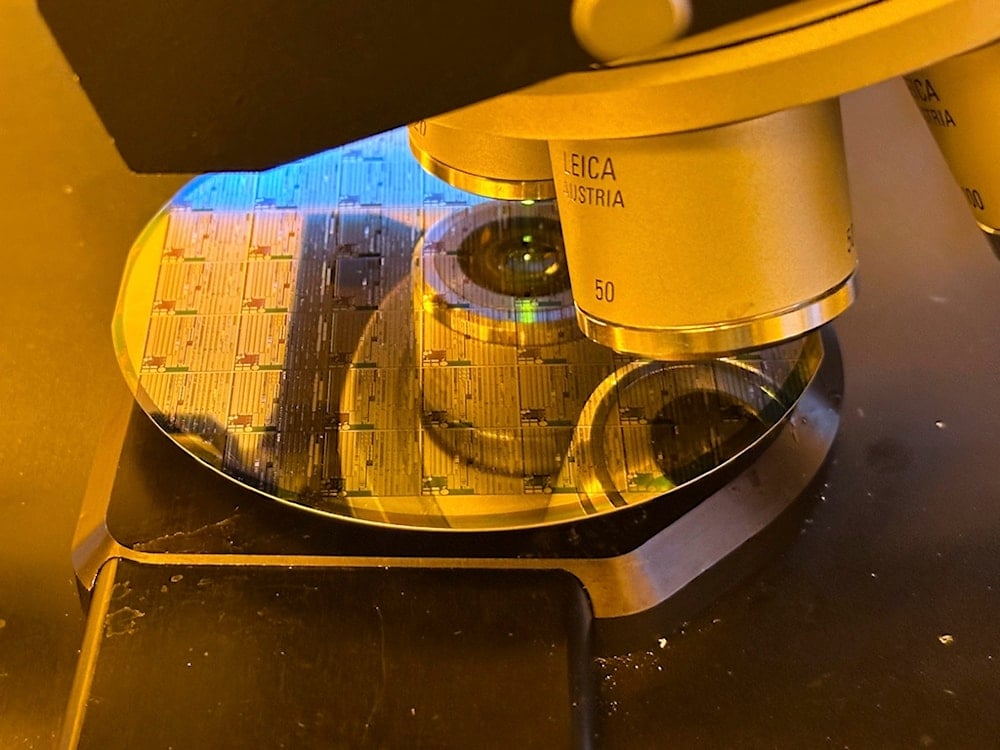Trump pushes to weaponize AI chip access in diplomatic talks
The Trump administration is considering replacing Biden-era restrictions on AI chip exports with bilateral government agreements, potentially eliminating the current global tier system to give the US more leverage in trade negotiations.
-

A semiconductor silicon wafer fabricated with multiple microchip microprocessors is at the school of microelectronic engineering at the Rochester Institute of Technology in Henrietta, N.Y., on Monday, April 14, 2025. (AP Photo/Ted Shaffrey)
Reuters reported on Tuesday that the Trump administration is considering significant changes to a Biden-era policy governing global access to advanced US-made AI chips. This is part of a broader effort to tie critical technology to US trade and diplomatic strategies.
The regulation in question, known as the Framework for Artificial Intelligence Diffusion, was issued by the US Commerce Department in January, just one week before the end of President Biden’s term. It seeks to restrict access to the most sophisticated computing power, keeping it concentrated within the United States and its closest allies while blocking rivals like China.
Currently, the framework divides the world into three categories:
- First tier: 17 countries, plus Taiwan, can import AI chips without limits
- Second tier: About 120 countries face strict caps
- Third tier: China, Russia, Iran, and the DPRK are completely barred from receiving AI chips
The rule, scheduled to take effect on May 15, is now under review by Trump officials, who are considering scrapping the tiered structure entirely. According to three sources familiar with the matter, they are exploring a more flexible system based on government-to-government licensing agreements, allowing chip access to be negotiated bilaterally, potentially turning advanced semiconductor access into a powerful bargaining tool.
"There are some voices pushing for elimination of the tiers," said Wilbur Ross, who served as Commerce Secretary under Trump, in an interview Tuesday. "I think it's still a work in progress." He added that bilateral government agreements were one of the alternatives under consideration.
Such a move would reflect Trump's longstanding preference for direct, transactional diplomacy and would give Washington greater leverage to tie critical technology access to broader economic and strategic negotiations.
Read more: Trump exempts key Chinese electronics from harsh tariff regime
Further proposed revisions include lowering the exemption threshold for chip exports that don't require a license. Under the current framework, orders below the equivalent of 1,700 Nvidia H100 chips are exempt from license requirements, requiring only notification. The Trump team is reportedly considering reducing that threshold to around 500 chips.
Tech negotiations
Commerce Secretary Howard Lutnick previously signaled in March that he favors linking export controls directly to trade deals, aligning with the administration’s vision of using technology dominance as a negotiating tool.
However, the Biden-era framework has faced criticism from industry leaders, who argue it could unintentionally push countries to turn toward Chinese-made AI technology. Oracle and Nvidia, two of the biggest players in the sector, have voiced concerns that strict limits on Tier 2 nations would incentivize them to seek "unregulated cheap substitutes" from China.
Read more: China’s Huawei develops new AI chip, seeking to match Nvidia
Ken Glueck, executive vice president at Oracle, criticized the inconsistencies in the tier system, noting that "Israel and Yemen were both in the second tier." He added, "Wouldn't surprise me they're going to take a new look at this."
Political opposition has also emerged; seven Republican senators sent a letter in mid-April to Secretary Lutnick calling for the framework to be withdrawn, warning that it would undermine US competitiveness by driving potential buyers into China's orbit.
"The restrictions would incentivize buyers, especially in Tier 2 countries, to turn to China's 'unregulated cheap substitutes,'" the letter warned.
While the Commerce Department has not commented publicly on possible amendments, sources emphasize that internal discussions are active and final decisions have yet to be made.

 4 Min Read
4 Min Read








